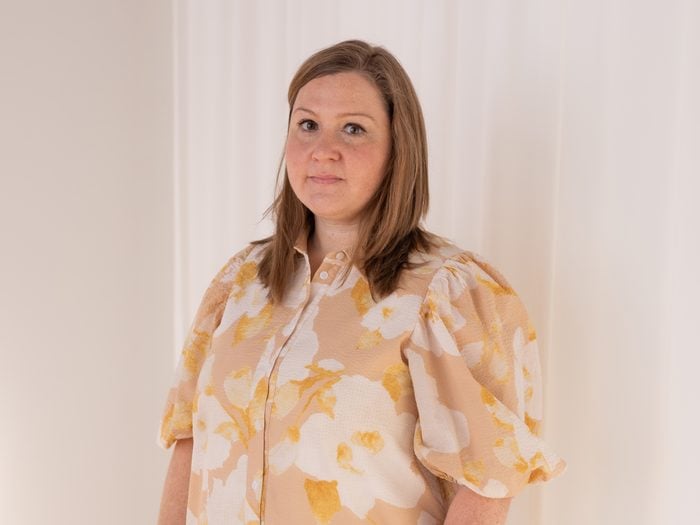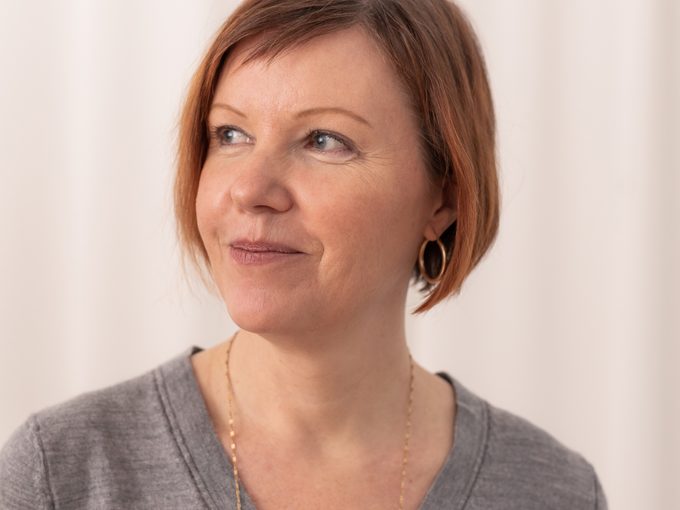Digestive Disorders Affect More Women Than Men. So Why Is It So Hard To Get a Diagnosis?

Women with digestive disorders are often dismissed and ignored, leading to pain and mental anguish.
There were a lot of low points along Amanda Propp’s four-year journey to a diagnosis for her digestive disorder, but she has a pretty clear memory of the lowest.
During the last year of her undergraduate studies at Queen’s University, she regularly visited the campus health clinic because of frequent stomach pain. At first, she thought she’d developed a lactose intolerance, but over a period of four months, her symptoms ramped up from inconvenient and distracting to excruciating and frightening. Anything she ate would go right through her. Scariest of all, she was seeing blood in her stool.
One night, the pain and bleeding were so severe that she checked herself into the emergency department. But she didn’t get the help she’d hoped for. “I went to the hospital, and the nurse said to me, ‘Well, are you sure that you’re bleeding from your bum and that it’s not your period?’” recalls Propp recalls, who had been dealing with symptoms for months and was very familiar with her menstrual cycle. “Even a doctor said to me, ‘I don’t really think you had blood.’ I just remember feeling like my experience was being minimized.”
According to the Canadian Digestive Health Foundation, more than 20 million Canadians suffer from digestive disorders each year. And yet, for many who experience one—whether it’s recurring diarrhea or constipation, or more severe symptoms—getting to a diagnosis (never mind treatment and relief) can feel like a confusing, uphill battle.
And of those millions of sufferers, most are women. According to the American College of Gastroenterology, women are diagnosed with irritable bowel syndrome (IBS) two to six times more often than men, and with inflammatory bowel disease (IBD)—which includes Crohn’s disease and ulcerative colitis—twice as often. Canada also has the unfortunate title of being first in the world for prevalence of IBD: One in 150 Canadians is diagnosed with the condition. (Theories as to why include western dietary patterns, stress levels and vitamin D deficiencies due to our greater distance from the equator, as well as the so-called “hygiene hypothesis”: Countries that focus on “clean” environments have fewer microbial contaminants, and their citizens seem to be at a higher risk for developing autoimmune conditions like IBD.) Additionally, up to 73 percent of women experience gastrointestinal symptoms—ranging from abdominal pain and diarrhea to nausea and vomiting—related to their menstrual cycle.
(Related: The Benefits of Adjusting Your Workouts to Your Cycle)
Despite this prevalence, getting to a diagnosis can be incredibly frustrating. The first barrier isn’t that surprising: Sufferers often feel stigma and shame around conversations about, well, poop. And it’s something that women seem to feel more acutely than men. While men will casually (and publicly) grab a newspaper on their way to the bathroom, one survey of 1,000 Canadian women found that 71 percent of them went to huge lengths to avoid having a bowel movement, particularly in a public bathroom. We see it reflected in pop culture and in our own experiences: A guy farts, and it’s hilarious; a woman does, and she’s mortified.
“It can definitely feel awkward for some people to talk about gas and bloating, diarrhea and constipation,” says Amy Chow, a registered dietician in Vancouver whose Chow Down Nutrition helps patients struggling with digestive issues related to food allergies and intolerances. But it’s not always squeamishness at the root of that awkwardness, she notes. “Some people feel embarrassed because they brought it up in the past and were dismissed by their practitioner.”
There’s certainly evidence that women experience that dismissal more often, too. One study in the journal Academic Emergency Medicine found that women experiencing abdominal pain in the ER had to wait an average of 33 minutes longer than men for pain-control medications—and were less likely to be prescribed them in the first place. Another found that women’s pain was underestimated compared to men’s, and they were more likely to be prescribed psychotherapy rather than pain medication. (Horrifyingly enough, the word “hysteria” comes from the Greek word for uterus.)

Once women do open up, their digestive disorders can still be tough to diagnose because the symptoms often overlap across several conditions. “The biggest challenge with many digestive health diagnoses is that the symptoms are very non-specific,” says Dr. Maitreyi Raman, gastroenterologist, nutrition specialist and clinician researcher and associate at the University of Calgary who studies the role of the diet on gut inflammation, as well as the relationship between the gut and the brain. “Symptoms of IBS may mimic symptoms seen with IBD. It may even mimic symptoms seen amongst new diagnoses of colon cancer.” Symptoms like abdominal pain, bloating and gas, as well as constipation or diarrhea (or both), can indicate any number of disorders—is it something you ate, or does it just never go away? That’s why context and supportive information like blood work, imaging and colonoscopies are very important to make a diagnosis, as are more alarming symptoms like bright red blood in your stool or unexpected weight loss.
(Related: Food for Thought: Can What We Eat Influence Our Mental Health?)
Patients can go long periods of time without a formal diagnosis, Raman notes, particularly if there is a lengthy wait to see a specialist. “It becomes very challenging in terms of how to apply therapies, or how to seek therapy,” she says.
Propp’s symptoms were repeatedly dismissed. Over eight months, she was in and out of the hospital twice and a regular visitor to the campus clinic. And while she underwent tests for parasites and bacterial infection, no doctor ever ordered a colonoscopy, a key step when a patient has what’s known as an “alarm” symptom: blood. Plus, like many women, she found herself being judged for her appearance—that she hadn’t lost enough weight to be as sick as she felt. “They just looked at me and said, ‘Well, you look pretty healthy.’ Because I wasn’t a size two, I feel there was a lack of appreciation for the severity of what I was experiencing,” she says. “I’m in health care now, and if anybody said, ‘I have blood in my stool,’ you know it’s a red flag.”
Propp was diagnosed with IBS—a common disease that can cause stomach cramps, bloating, diarrhea or constipation—but that wasn’t sitting right with her. “I was looking up irritable bowel syndrome, and I thought, ‘This just doesn’t describe me,’” she says, noting that IBS sufferers never have blood in their stool. “I remember how it impacted my life back then. I remember being so worried about going out anywhere in case I urgently needed a washroom. And it just felt like no one could offer me any help.”
She continued to have bouts of diarrhea and pain, and then four years later, she hit another so-called “flare”: “Every time I went to the bathroom, it felt like my insides were going to fall out, the pain was so bad,” she says. But by this time, she had a family physician who took her seriously. He ordered blood tests, spotted inflammatory markers and got her an appointment with a gastroenterologist, who immediately arranged for an emergency colonoscopy.
The results were clear: She had ulcerative colitis. It’s a form of IBD that can come with life-threatening complications if left untreated, and by the time Propp was finally diagnosed, her colon was so inflamed she was in danger of it perforating. She’d also spent the previous four years missing classes and fretting about bathroom locations anytime she was out of the house—an incredible emotional burden, and a lot of time she won’t get back. Propp will likely be on and off medications for the rest of her life (she’s presently considered in remission), but having a viable treatment plan, as well as a group of doctors who finally recognized what was going on with her, meant everything.
When women come up against these kinds of walls in their path to a diagnosis, it can sometimes help to get another opinion, like Propp did. She believes it made a different to have her own doctor, who knew her well, rather than rely on walk-in clinics, as she did when she was a student. When Chow sees a patient who’s either been unsuccessful in getting answers from their GP or hasn’t spoken with a doctor at all, she’ll look at their symptoms and outline the tests they need to ask for. In some cases, she will recommend a referral to a specialist for a colonoscopy. “We can also advocate for the clients by communicating directly to the doctor if they don’t feel comfortable or they already tried in the past,” she says. “But I always encourage people to continue that relationship with their doctor, going back for follow-ups and letting them know that you’re still not feeling well.”
And if you’re feeling outright dismissed, like Propp was? “Get another opinion,” she says. “Nowadays, it’s pretty convenient with telehealth services.”
(Related: 14 Virtual Care Services in Canada You Need to Know About)

While Propp’s symptoms were severe, a digestive disorder doesn’t have to be that debilitating to have a serious impact on a person’s life. Ivy Young, who works in curriculum development for the University of Calgary, was in her late 20s when she started to experience bloating and stomach aches almost every time she ate. She was a vegetarian, and things she’d eaten for years—peanut butter, tofu dogs, wheat of any kind—were suddenly triggering a reaction.
Six years into the bouts of symptoms, and still without a diagnosis, she developed a bumpy, painful rash. She first sought a test for celiac disease from her GP, which came back negative, so that was the end of that road. “It was my vanity that got me to seek out other help, since these bumps on my jawline and my throat were so visible and large,” she says. “I had to accept the fact that I wasn’t feeling good.”
She’d been seeing a doctor of traditional Chinese medicine to help with stress and her digestive issues, and while her treatments were helping with the former, she also connected with a naturopath to try an elimination diet. It took about a year of cutting out and re-introducing foods to discover what was triggering her reactions. She learned that when she stopped consuming wheat, sugar, tofu, vinegar, wine and dairy, she would feel better. “I noticed such a decrease in inflammation, increase in mental clarity and decrease in depression,” she says.
(Related: 8 Signs You Need a Mental Health Day)
Still, says Young, she sometimes feels frustration over the lack of answers—and no clear diagnosis—for why her body started to reject foods she’d always eaten. And the new diet is not always easy to stick with. “If I’m looking for that external validation that, yes, I don’t feel good after these foods, it’s never happened. Because no doctor has ever said, ‘You really shouldn’t eat this.’”
Chow herself has seen how that lack of clarity can be deflating for her patients. “When you don’t have a diagnosis, it can feel like your symptoms aren’t true or valid,” she says. “A lot of the clients I work with, they’ve already tried different diets, they’ve reduced foods, and the restrictions become more [intense] without them really understanding the reasons why these foods are bothering them.”
Elimination diets, which are often used to see if a food sensitivity is the cause of symptoms, can be tricky to manage on your own—particularly when it comes to determining when and how to reintroduce a food to identify if it’s a trigger for gastrointestinal issues, as well as ensuring a balanced diet of vital nutrients. And without a support person to guide you through dietary changes, other problems can come up. “Because of the gut-brain connection, going through these diets can be very stressful and anxiety-provoking, and then that cycle of having more stress, anxiety and depression is going to fuel your symptoms‚” says Chow. “You’re just really guessing at that point—and there’s just a lot of misinformation out there.”
It can still seem like there is a lot of trial and error involved on the path to feeling better, but there are some encouraging current studies in gut health. Many of them look at the gut microbiome—the trillions of bacteria, fungi and microbes that are part of the digestive system—and have focused on how food, stress and other factors can shift that system toward “healthy” bacteria that can affect GI symptoms for the better. In fact, shifts in the makeup of our microbiome are among the prevalent theories for why people can develop allergies or intolerances to foods later in life, whether it’s from travel (eating foods that introduce new bacteria to the gut), life events like pregnancy, or even doses of antibiotics that the gut doesn’t fully recover from.
The University of Calgary’s Raman has been studying the role of various therapeutic diets in the context of IBD, like the Mediterranean diet, which emphasizes healthy oils, fruits and vegetables, dietary fibre, limited processed foods, food additives and meat proteins. An anti-inflammatory diet like the Mediterranean diet has been linked to lower levels of diabetes, heart disease and other conditions, as well as the potential to recover a healthy gut microbiome. Raman was recently published in the Lancet Gastroenterology and Hepatology showing that the Mediterranean diet can also go a long way toward reducing gut inflammation and alleviating suffering from Crohn’s disease. Hers and similar research concluded that after 12 weeks on an anti-inflammatory diet, not only did patients feel better, their gut bacteria also shifted in a positive, healthy direction—and that shift toward more diverse bacteria in the gut microbiome may be protective against developing future flares in patients with Crohn’s disease.
As to why women are more likely to suffer from diseases like IBS or constipation, there are a few theories, but surprisingly few studies on it. A 2015 study from the American Physiological Society suggested it was because nerve cells that control the movement of food through a woman’s intestine are more sluggish in response to brain input than in men. Stress is also a major contributor to diseases like IBS, and the American Psychological Association notes that women are more likely than men to report physical and emotional symptoms of stress. And then layer on the hormone changes that happen during women’s menstrual cycles—those same hormones are also known to exacerbate IBS symptoms.
For Young, a big part of recovery was learning to let go of the social angst and stigma she felt about not being able to eat certain foods. “I’m still embarrassed about saying that I have food sensitivities if I’m going to somebody’s house for dinner, and I minimize it constantly in my own mind,” she says. “But for me, it is a women’s issue, because we’re often not validated with our health issues. I guess I’ve had to learn that it’s okay—it’s okay that I’ve got special needs. I wish I could eat everything that I wanted. But this is a real thing.
Next: How to Build a Strong Microbiome to Improve Your Gut Health




